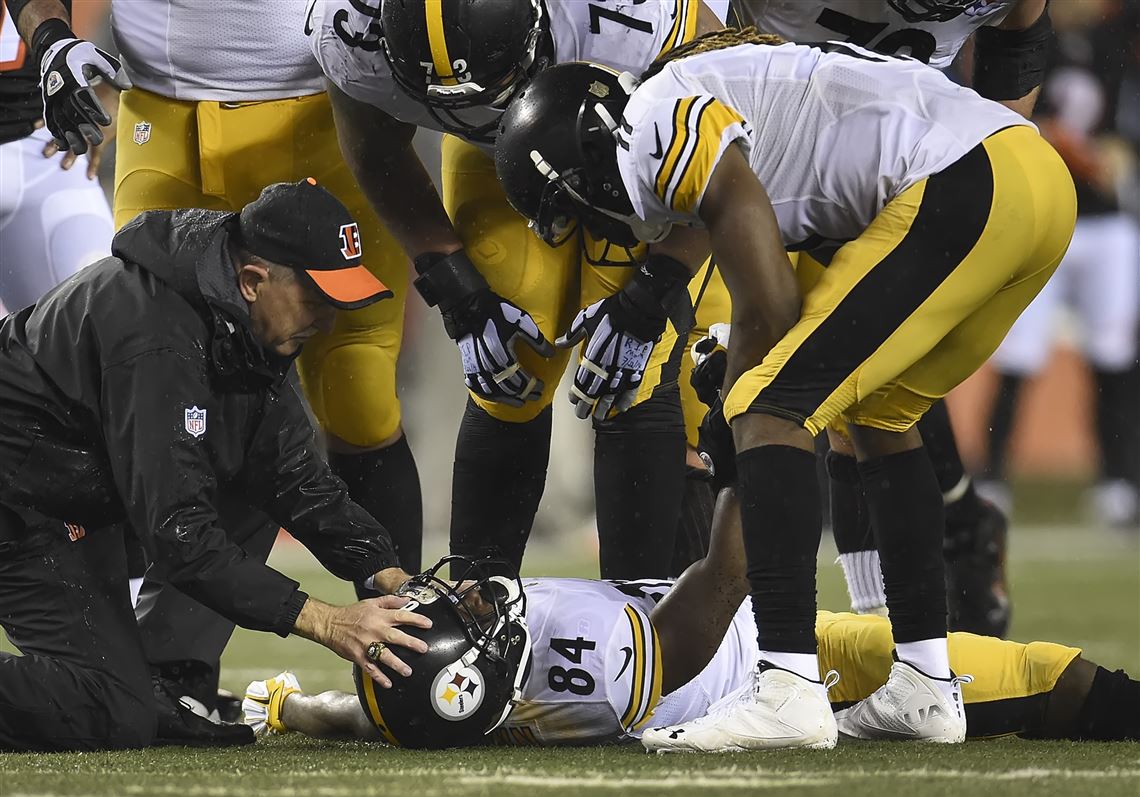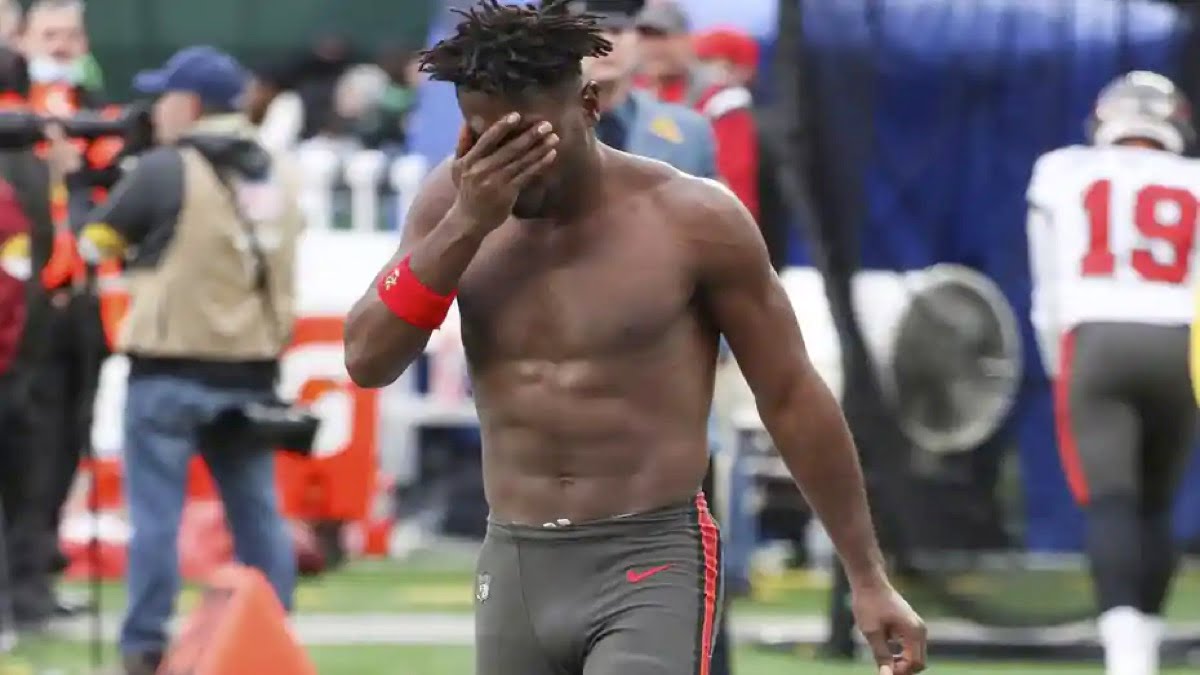We’re more willing to discuss mental health now, both its importance and its fragility. This is a good thing.
This has led to more discussion of the mental health of professional athletes, though, and that can quickly become more problematic, especially if you’re talking about it on the air.
As soon as Antonio Brown slithered out of his shoulder pads on the Bucs sideline and threw his receiver’s gloves into the crowd at MetLife Stadium on Sunday, people began expressing concern about the receiver’s mental health. This made me deeply uncomfortable not because of the topic, but because terms like “compassion” and “empathy” were being used to praise anyone who decides not to pass judgment or offer an opinion on someone — anyone — who’s acting in a dysfunctional way. That’s a challenge for anyone hosting a sports-talk show because offering an opinion and passing judgment is kind of what we do for a living.
So how are we supposed to do that? Well, Demetri Ravanos made a really good point earlier this week: We shouldn’t stop short when it comes to calling out dysfunctional behavior though he phrased it more eloquently: “Don’t be afraid to call a jerk a jerk.”
I’d like to take it a step further and provide some more specific tips.
Don’t attempt a diagnosis
None of us in sports media are trained psychologists. At least I’m not aware of anyone in the chattering class with that level of expertise, and if there does happen to be a trained shrink in our ranks, you can go ahead and ignore anything else I have to say here because you certainly know more about the subject than me.
The fact that mental health is discussed more openly means we’re more familiar with terminologies like post-traumatic stress or bipolar disorder. But these are clinical terms referring to very specific conditions that people study for years before they’re deemed qualified to diagnose it. You don’t need a license to talk about it on the air, though, which makes it easy to get carried away. Boomer Esiason, specifically, has shown a tendency to describe athletes as bipolar, which says more about Esiason than the athletes he’s criticizing.

Remember the players are not our patients
All we have to go on is the public statements, the personal history and the hearsay of others, and while that constitutes a significant amount of material given today’s media environment, it’s only a small fraction of their overall lives. This is true even for someone like Brown, whose past three years is full of arrests, firings and a civil lawsuit for sexual assault, which he settled.
There’s way more we don’t know, though, including whether he has been diagnosed with a disorder, treated or even medicated. We don’t necessarily know about steps he’s taken to make amends or atone for those actions, and while I don’t think we should assume that he’s done any of that, I don’t think it’s fair to assume he hasn’t, either.
And yet any discussion of Brown seems to veer toward this question of just what is wrong with him whether it’s the legacy of the hit he took from Vontaze Burfict back in 2015 or his often erratic behavior over the past three years.
Describe what happened in specific terms
There is a tendency to use terms like “blow-up” or “tirade.” “Outburst” is another favorite as is “controversy.” But these don’t really tell us what happened, and they lump it together with anything else that has attracted attention.
In this case, Brown made a very dramatic exit from his job in the middle of a shift. He took off his shirt, threw his gloves into the crowd and performed a hybrid jog-jumping jack across the end zone to the exit. After the game, his coach said he was no longer a member of the team.
Brown did not seem particularly angry. He did nothing violent. He appeared to quit in a very public way, but by Monday morning there were indications he may have been fired for not returning to play because he felt his ankle wasn’t healthy. Brown released a lengthy statement on Thursday, stating that he didn’t quit, but rather he was cut for not playing through an ankle injury after receiving a shot to treat the pain.
In other words: What appeared to be a public meltdown by a player with a record of off-the-field transgressions was actually an employment dispute about his participation. Not exactly the mental-health crisis plenty of people assumed.
Should this athlete be employed by a team?
This doesn’t require clinical expertise or advanced schooling. In fact, this discussion is pretty close to a bedrock of this business, and you can offer an opinion on everything from whether Brown should have been employed by the Bucs in the first place to whether he should be given another opportunity without offering an assessment of what’s going on between his ears.
Do I hope for the best for Brown? Sure. In the same way I hope that everyone finds a lifestyle in which they are happy and not harming anyone, including themselves. Do I feel bad for Brown? I don’t know enough about him to know if I should. Given the fact he released a rap single on his Instagram page after walking out of the game, and indicates he was treated unfairly by the Bucs, it at least leaves open the possibility he’ll be more happy somewhere else.
What I do know is that making the conversation of Brown’s departure about mental health in general was misguided even if it was well-intentioned. As far as I know, he’s never discussed any disorder he might have, and the most consistent theme in his public statements has been his belief that the problems come from too much scrutiny being placed on him. I don’t need to offer a clinical diagnosis to tell you that I don’t buy that for a second.
Danny O’Neil is a sports media columnist for BSM. He has previously hosted morning and afternoon drive for 710 ESPN Seattle, and served as a reporter for the Seattle Times. He can be reached on Twitter @DannyOneil or by email at Danny@DannyOneil.com.







